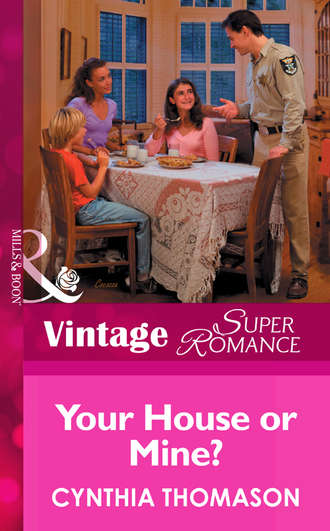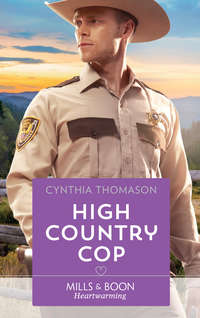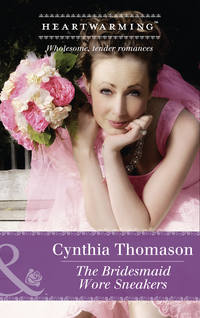
Полная версия
Your House or Mine?

“How long do you plan to stay today, Murdock?”
“Another hour or so. Then I have to get to work. I have a town to protect.”
“I know I feel better knowing you’ve left my house and are out in the community securing our safety.”
Wade chuckled and turned back to fixing the window.
Meg smiled as she went into the house. The words she’d just spoken were actually the exact opposite of the way she was beginning to feel about Wade. She’d missed seeing his patrol car in the drive yesterday. And she’d been relieved to find the car by the barn today. As much as she might try to fight it, she was starting to like the man, a dangerous and unwise reaction to a person who was trying to sabotage her dreams for the future. But, darn it, he was just easy to like.
“Keep your mind on your goal, Meggie,” she said to herself. “Find the deed and protect your rightful ownership of this house. Remember, Wade Murdock has a good job and a secure future. He'll survive the disappointment.”
Dear Reader,
This book is about special places. We all have at least one. It could be a place we’ve visited all our lives or one we’ve yet to discover, but it’s out there waiting for us to stumble upon its magic. My special place is a rambling old farmhouse in western Kentucky where my aunt and uncle lived and where I spent some of the happiest moments of my life.
It’s gone now, this house, passed to other hands, to hearts that I hope will hold it as closely as I still do. In my mind I will always remember the plank wood floors, the old wooden rockers, the upright piano and every Christmas decoration that turned this home into a wonderland each December.
In these pages you will read about such a house and two very different, wounded people who both long to cherish it forever. But only one of them can have it. I hope you enjoy this journey of a man and woman who find their heart's desire, and perhaps a miracle or two, within the walls of a very special place.
I love to hear from readers. Please visit my Web site, www.cynthiathomason.com, or e-mail me at cynthoma@aol.com. My address is P.O. Box 550068, Fort Lauderdale, Florida 33355.
Sincerely,
Cynthia Thomason
Your House or Mine?
Cynthia Thomason

This book is dedicated to my best “Buddy,”
my husband and cherished traveling companion
for the past twenty-six years. Thanks, Walter, for paying
my admission to all those tours of old houses
and never once complaining.
CONTENTS
CHAPTER ONE
CHAPTER TWO
CHAPTER THREE
CHAPTER FOUR
CHAPTER FIVE
CHAPTER SIX
CHAPTER SEVEN
CHAPTER EIGHT
CHAPTER NINE
CHAPTER TEN
CHAPTER ELEVEN
CHAPTER TWELVE
CHAPTER THIRTEEN
CHAPTER FOURTEEN
CHAPTER FIFTEEN
CHAPTER SIXTEEN
CHAPTER SEVENTEEN
CHAPTER EIGHTEEN
EPILOGUE
CHAPTER ONE
MEG HAMILTON REACHED for the telephone with one hand and grabbed a pen and paper with the other. She flinched at the recurring pain in her neck as she once again held the receiver to her ear with her shoulder and said, “Colonial Auction House. Meg speaking.”
She tried to be patient with the caller. “Mrs. Winkler, as I told you yesterday, you don’t have to call every afternoon to confirm. You have an appointment for tomorrow. Our buyer will be at your home just as I explained to you a week ago when you first contacted us.”
She nodded her head several times in tempo with the nervous woman’s plaintive voice. “Yes, I promise. My brother Jerry will be coming with a truck and a helper. They’ll pick up anything you want to consign to the auction.” She blew out a long breath as the caller once again repeated what Meg had just said. “Yes, that’s right. Until tomorrow then. Goodbye, Mrs. Winkler.”
Meg leaned forward to settle the phone into its cradle. Then she put her elbows on the desk and massaged her temples. It was four o’clock, the end of an especially grueling day. Time to pick up her son at the neighbor’s house and go home, if only Jerry would get back from his last call of the day. She was imagining a tall glass of iced tea and her favorite chair when she heard the repetitious beep of the auction house truck as it backed up to the loading door. “Thank goodness.”
Moments later Jerry poked his smiling face inside the entrance of their building. “Hi, sis, has it been busy around here?”
Meg could only stare at him. It really was a rhetorical question because he darned well knew the answer. She often thought Jerry got the best of the deal in their business partnership, just as he’d gotten off easy growing up as her kid brother. He drove around in the truck all day making house calls and picking up merchandise for their weekly auctions. She was stuck in the building for eight hours answering the phone, handling drop-in customers, and inputting auction debits and credits on a computer spreadsheet, not to mention acting as the auctioneer.
She didn’t even try to hide her fatigue and frustration when she said, “If I have to answer that phone one more time…”
Of course it rang.
“Get that, will you, Meggie?” Jerry said. “I want to bring something from the truck to show you.”
She groaned once, picked up the phone, and immediately switched to her professional voice. She politely explained to the caller that a ten-year-old sofa which had coexisted with eight cats probably would not sell at Colonial Auction. She’d just ended the call when Jerry clanked and rattled back into the building.
Meg gaped at the rough-hewn piece of lumber in his right hand. It was about ten inches in diameter and nearly as long as he was tall. In his left hand he held an assortment of chains and hooks and other metal fittings she couldn’t identify.
Jerry dragged the contraption to the desk and stood grinning down at her. “Isn’t it great?”
“It might have been once,” she admitted. “But now, maybe a hundred years later, I haven’t the faintest idea what it is.”
“You’re wrong about the age. It’s more than a hundred years old.” Jerry stood the end of his worn log on the office carpet and gave the antique a look of reverence. “This probably went west with the pioneers a hundred and fifty years ago.”
Jerry imagined potential heirlooms in every cast-off piece of flotsam sticking out of a garbage can. And he was usually wrong. Meg liked old things too, pretty ones whose value could be verified in a collector’s catalogue.
She scrunched up her nose at the worm-eaten log. “You still haven’t told me its use,” she said. “If, indeed it has, or had one.”
“It’s a doubletree,” he announced, draping the chains over his shoulder and running his palm halfway down the length of the lumber. “See how it’s arched in two places…” He jerked his hand away and pulled a splinter out of his little finger with his teeth.
Meg automatically opened a drawer to get the antiseptic ointment and tin of bandages she always kept handy.
“That’s so the farmer or wagon driver could fit it over the necks of his team of oxen,” Jerry explained. “Then, of course the chains and hooks enabled him to attach the yoke to the tongue of the wagon.” He rattled the chains still dangling from his shoulder. “Amazing, isn’t it? This thing’s as good as new.”
Meg handed him a bandage and pointed to the nearest window. “Truly amazing, Jerry. Just this afternoon I was wondering how we were going to bring in our oxen from the south forty along Colonial Boulevard in downtown Orlando. Looks like that problem’s solved.”
He scowled at her. “Go ahead and make fun, but this is a real antique. And the guy I bought it from…”
The hackles stood up on Meg’s neck. “You actually paid money for this?”
“For something this rare? Of course. A hundred and twenty-five bucks—a bargain.”
Somehow Meg managed to keep the scream in her head from erupting into what her brother would call another hissy fit. She’d long ago accepted that she was the sensible, mature one, and Jerry, five years her junior, was the charming, unpredictable one—the one she’d helped out of too many jams to remember. Now he was the one who was adored by everybody who came to the auction while she was the one they mostly tolerated. But never was this personality difference more difficult to accept than when money was concerned.
She drummed her fingers on the desktop and spoke calmly. “Jerry, do you remember me telling you this morning that I didn’t know how we were going to pay next month’s rent? Much less the Yellow Pages ad, workman’s comp insurance and a host of other bills.”
“Sure I remember, but I think the doubletree will bring at least three hundred at the next auction.”
Suddenly Meg had a splitting headache. She could practically feel the veins tightening behind her eyes. And worse, the phone rang for the hundredth time. She tried but couldn’t find her professional voice. “Colonial Auction,” she half barked into the phone.
The voice that responded was competent and controlled. “Is this Margaret Hamilton?”
“Yes.”
“This is Nadine Harkwell, administrator of the Shady Grove Convalescent Center in Mount Esther, Florida.”
“Convalescent Center?” Meg repeated. “Is this about my aunt?”
“I’m afraid it is.”
Meg’s stomach plummeted. Her great-aunt Amelia was elderly, ninety-two on her last birthday. And while her mortality was something everyone in the family would have to face, Meg had never wanted to think about it. Aunt Amelia was a treasure. And she’d seemed in good health and great spirits when she’d traveled by bus to Orlando to spend Christmas with the family. That had only been six months ago.
“What’s wrong with my aunt?” she asked. “She’s not…?”
“No, Ms. Hamilton,” Nadine Harkwell said. “Amelia hasn’t passed away. But she fell in her home on Sunday. Broke her hip and bruised some ribs.”
She fell four days ago? “Why didn’t anyone call me before this?” Meg asked.
“Amelia didn’t want us to call until now. I should tell you, though, that she’s confused and disoriented. It’s no secret to those of us in town,” she added in a conspiratorial whisper, “Mrs. Ashford has been suffering from dementia that has worsened considerably in the last few months. I’m afraid that because of this fall, she’ll never be herself again.”
Meg talked to her aunt at least every other week. She hadn’t noticed the woman’s mental capacity slipping. But maybe she should have been listening more closely. “What can I do?” she asked. “Can I talk to her?”
“That wouldn’t be practical. Amelia probably wouldn’t even recognize your voice. But in one of her lucid moments today she asked for you. She wants you to come to Mount Esther. Something about settling her affairs. I can give you more details when you arrive assuming you are able to come.”
“Of course I’ll come. I’ll be there tomorrow.”
Something near panic was etched on Jerry’s features. Tomorrow? he mouthed, having heard only her part of the conversation. You can’t go tomorrow.
Meg silenced him with a warning look. Leaving the auction in Jerry’s hands was just one of the problems she would have to address before leaving for Mount Esther. A minor one really when compared to the welfare of her ten-year-old son who still had a week left in the school year before he’d be out for the summer. What was she going to do about Spencer? Still, she reconfirmed the plans with Nadine. “Tell Aunt Amelia I’ll be there tomorrow afternoon. And tell her I love her.”
Meg hadn’t even hung up the phone when Jerry asked in a voice high-pitched with tension, “You’re leaving? How long will you be gone? A day? Two?”
The last thing Meg needed right now was her brother’s attempt to make her feel guilty. He would just have to manage the auction without her.
“How nice of you to ask about our aunt, Jerry,” she said, using sarcasm to switch the burden of guilt to him. “She fell in her house, suffered a broken hip and other injuries, and isn’t coping well mentally.” She stood up and removed her purse from the desk drawer. “I’ll be sure and tell her you send your regards.”
“Oh, fine. I guess it makes you feel better to make me look like the bad guy. I’m not the one leaving town. And of course I care about the old girl, but it’s no secret that you were always her favorite.”
Meg couldn’t argue. Her unflagging sense of responsibility had earned her the title of “favorite” with most of their extended family. Jerry was the one who made everybody laugh. Meg was the one they depended upon.
She walked out of the office and into the section of the auction house where the customers sat. “I have to go home and pack. I don’t know how long I’ll be gone. Hopefully I’ll just miss the Saturday auction, but I’ll call tomorrow and give you an update. Aunt Amelia wants me to handle her affairs, but at this point I don’t know exactly what that means or if I can accomplish anything with the weekend coming up.”
“You can’t stay away too long,” Jerry pointed out. “Spencer’s got school, doesn’t he?”
Meg had already come up with a plan for her son. “I’m not taking him. I’ll leave him with Mom.”
Jerry shook his head. “Not unless you think your ten-year-old kid wants to jump on board a geriatric Greyhound bound for Biloxi for a week of playing the slots.” He smiled. “Mom’s Golden-Agers are on the move again, this time with pockets full of quarters.”
Meg dropped into the nearest chair. “Darn. I forgot.”
“No problem. I’ll keep the sprout.”
Meg gasped. “You?”
Jerry pretended to be offended, maybe actually was a little. “Meg, we’re talking about my favorite nephew here. You know I’ll take good care of him. Besides, I am an adult.”
“I’m not sure twenty-seven going on fourteen qualifies.” Meg regretted her words the moment they’d slipped out of her mouth. How could Jerry ever live up to her expectations if she didn’t expect more from him? “Anyway,” she said, trying to cover her blunder, “I’m counting on you to run the business.”
His previous doubts about taking charge seemed to have faded, and he gave her a smug look. “You manage the whiz kid and the auction, so why shouldn’t I? I’ll get a couple of my friends to help out temporarily. Look, sis, do you have any other ideas?” Jerry added when she hesitated to trust him with her son. “I’ve got one big advantage over anyone else you might think of to babysit. I’m here, and I’m offering.”
It was a convincing argument. And on short notice, Meg had no other choice. She sighed. “Okay, but you’ll stay at my house, so Spence has all his stuff and he’s near the school. And you’ll drive him there every morning by 7:45 and pick him up at the neighbor’s every afternoon?”
Jerry nodded. “Yes, yes, and yes. I’ll be there in the morning. Don’t worry. My nephew is a chip off the old Hamilton block. He idolizes me.”
“That’s what worries me. But thanks, Jerry. I really appreciate this.”
“No problem.”
She headed for the door but stopped before going outside. “One more thing. No parties. And no poker games or gambling of any kind in the house.”
Jerry saluted. “Right. I’ll make sure the kid knows he’d better not negatively influence me.”
Despite the rough day and the bad news from Mount Esther, Meg was smiling when she got in her car.
AT 7:30 THE NEXT MORNING Meg double checked Spencer’s backpack to make certain he had the supplies he would need for the day. Once satisfied that the pack was in order, she took a frozen juice box from the refrigerator and tried to stuff it into his nylon lunch sack.
Her son gave her a look that combined exasperation with sympathy. “Mom, will you relax? You already put juice in there.”
She looked down and frowned. A brightly colored box was nestled between a baloney sandwich and a bag of chips. “So I did.” She took the extra one out and tossed it back into the case of twenty-three others she’d bought the night before at the wholesale club. Then she hurried to her front window and scanned the street with mounting panic. “Where is Uncle Jerry?”
“Right here,” her brother said two seconds after the back door slammed. He entered the living room and announced, “My car’s in the driveway. I must have missed your radar by coming in fast and low.” He ruffled Spencer’s hair. “Ready to go, kid?”
Spencer slipped his backpack over his shoulders. “Yep, I’m ready.”
Meg wrapped her son in a huge hug. They’d never been apart for more than a day or two since Spence had been born. There hadn’t even been a problem when Meg divorced Spencer’s father two years ago. Dave had walked out without a backward glance and without asking for visitation rights. It was as if Dave Groller had never been married and didn’t have a son.
In the beginning, when Spence was born, Dave seemed to enjoy being a father. At least he’d soaked up the attention he got whenever he took their son to the park or wheeled him in the stroller. But that was when Dave had enjoyed being a husband, too. When Spence had grown older, more demanding perhaps, he’d tried every childish trick he could think of to get his father’s attention. And then Dave left, and Spence had to live with the fact that his father didn’t care about him.
Meg held her son’s face between her hands and studied his features. Unlike Meg, whose complexion was coppery and whose hair had the deep auburn highlights of her mother’s side, Spencer had inherited the handsome Hamilton traits of his grandfather and his Uncle Jerry—fair, lightly freckled skin, emerald-green eyes, and thick, wheat-colored hair. In appearance, he was a Hamilton through and through, which is one of the reasons Meg reverted to her maiden name when the divorce from Dave was final.
But contrary to his genetic makeup, Spencer had become a bookish sort of boy since his father left them. His beautiful eyes peered through the unbreakable lenses of heavy-duty glasses. And he rarely played outside, even in the near-idyllic sunshine of central Florida. He much preferred his room with its ever-expanding shelves of books and computer games.
“I’ll call you every day,” she said, at last prying her hands away from his cheeks. “And I’ll have my cell phone on all the time so you can reach me.”
“Okay.”
“You mind your Uncle Jerry.”
“I will.”
Jerry put his hand on her shoulder in a comforting gesture while glancing at his watch. “It’s seven forty-five, sis. I’m trying to keep to the schedule you set up, but you’re holding us back.”
“I’ll be fine, Mom, don’t worry,” Spencer said.
“I know you will. Go on now.”
Meg stood at the door until Jerry backed his car out of the drive. Then she shook off an uncomfortable feeling of emptiness and tried to concentrate on the day ahead. She knew she could trust Jerry to take care of Spencer. He truly loved her son. But the auction—that was another story. She could only pray she had a business to come back to.
She went into her room to retrieve her suitcase. She had almost a five-hour drive ahead of her, and even though every mile was taking her away from Spence, a familiar feeling of anticipation flowed through her now that she was only minutes away from leaving. After a nearly four-year absence, she was going back to Mount Esther, and in a way, it was like going home.
AT ONE O’CLOCK Friday afternoon, Meg exited Interstate 75 onto a two-lane county road about fifteen miles south of the Georgia border. The road twisted and dipped in a westwardly direction over rolling hills. After twenty minutes she had her first glimpse of the Suwannee River through a thickly wooded area of oak and mulberry trees.
She turned off her car air conditioner and rolled down the window. This far north, the humid June heat of Orlando was gone, replaced by a moist cool breeze that rustled the spring blossoms of purple and white trilliums along the side of the road. The rich, pungent smell of damp earth, and the fragrant scent of wildflowers teased the air outside the window.
She rounded a curve that led into an expanse of flat land between the hills and immediately spotted the sign announcing her arrival in Mount Esther. Population 1412, it read. She smiled when she remembered that a member of the town council was appointed every year to change the figure with each birth and death in the close-knit community.
At the traffic light in the center of Mount Esther’s business district, she turned right onto a narrow road that led across a single-lane wooden bridge spanning one of the tributaries to the Suwannee. After a mile she reached the turnoff to Aunt Amelia’s gracious old Victorian home—the home that Amelia had deeded to Meg several years before.
INTENDING TO DROP off her belongings before heading to Shady Grove, Meg drove up the lane to the house. She frowned as she noticed the large potholes in the sparse gravel. This lack of attention to upkeep wasn’t like Amelia. Each spring she ordered truckloads of gravel for the drive so it was neat and resistant to flooding during the rainy season. It also looked as though the trees hadn’t been trimmed in ages. The magnificent live oaks dripped with spongy gray moss that bristled against Meg’s windshield and cloaked the road in deep shadows.
But soon she cleared the three-hundred-yard drive and had her first look at the house. The green and cream colors she remembered seemed duller now, faded in the harsh Florida sun, but the structure, with its turret and peaks and wraparound porch was still a remarkable example of Queen Anne Victorian. Meg might have simply stopped for a moment and enjoyed the welcome sight had it not been for one detail that was completely out of place.
A police car was parked midway between the house and the barn.
Her heart pounded. Meg considered that she should approach the parked car with caution. After all, if a crime were being committed at this moment, she shouldn’t interfere with police procedures. And she certainly didn’t want to become a victim herself. But concern for her aunt’s home, and basic burning curiosity, got the best of her. She accelerated and pulled alongside the police car.
Mount Esther Sheriff’s Department was printed on the driver’s door panel. Meg shifted her car into park and peered out the windows to scan the backyard and trail to the barn. Seeing no one, she opened her door and stepped onto the path.
And then she spied a tall man pushing a wheelbarrow out of the barn. There was nothing in his appearance or demeanor to indicate that he was a law enforcement officer. He was dressed in blue jeans, a plaid shirt, and a Yankees baseball cap. He turned the wheelbarrow to guide it around the side of the building.
Realizing that for the moment at least she was the only other person witnessing this activity, Meg hoped she’d catch the attention of the police officer who must be elsewhere on the property. This was her aunt’s home—she wasn’t about to stand by and let someone take something from the barn.
“Hey, you there. Stop!”
Amazingly the man did what she said. He set down the back supports of the wheelbarrow. Then he stared across the open space at her and said, “Okay.”
Still looking around for the police, Meg marched up to him. He truly didn’t look all that threatening up close though he stood over six feet. He appeared strong but with a lean, solid strength defined by hard work rather than the sculpted tone of weight training. He took a kerchief from his back pocket, removed his cap and wiped his brow. After stuffing the cloth back into his jeans, he said, “Do you want something?”
Meg put her hands on her hips and tried to make the most of her five feet five inches. “What are you doing?”








